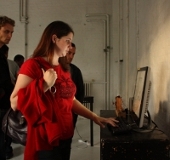In the course of developing my errant games, Anomie and Tempo, I began to look into the history of automata. I was partciularly interested in a chess playing automaton created in the eighteenth century. I was directed to it by a reference in Walter Benjamin’s first thesis on the philosophy of history, whereas the automaton serves as a metaphor for his methodology – like the automaton, historical materialism always wins, but like the automaton it cheats, something is hidden inside. For the automaton it was an expert chess player hidden in the box, for Benjamin’s methodology it is theology.
A curiosity, then, is a story that is repeated when the automaton is confronted with the sovereign. The sovereign, perhaps seeing that it will bested, attempts to cheat:
The game opened, the Emperor made two or three moves, and intentionally a false one. The automaton bowed, took up the piece and put it back in its place. His Majesty cheated a second time; the automaton saluted again, but confiscated the piece. ‘That’s right,’ said His Majesty, and cheated the third time. Then the automaton shook its head, and passing its hand over the chessboard, it upset the whole game. The Emperor complimented the mechanician highly. (Quoted in Tom Standage, The Turk : The Life and Times of the Famous Eighteenth-century Chess-playing)
This story is repeated in an (almost certainly fictional) account of its confrontation with Catherine the Great. The impulse to cheat can be viewed as a desire to bypass the automaton’s temporal agency to bring about a position that would take multiple turns to accomplish. But though absolute, the sovereign cannot bring this about – the automaton’s semi-façade of being a pure machine outside the rule of sovereignty allows it to practice defiance, abolishing the entire game in a gesture akin to the general strike.
 A Clockwork Exception
A buggy clock pulls the viewer into its own self-regulation. Part of the 'Jokes in Systems' series.
A Clockwork Exception
A buggy clock pulls the viewer into its own self-regulation. Part of the 'Jokes in Systems' series.
 Errant Gaming
Generative disruptions to game mechanisms. Part of the 'Jokes in Systems' series.
Errant Gaming
Generative disruptions to game mechanisms. Part of the 'Jokes in Systems' series.